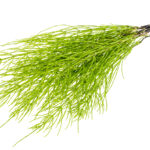How to improve your bone, skin and hair health naturally
 (NaturalHealth365) Horsetail – a tall, shaggy weed that grows in wetlands and woodlands throughout North America – may not appear particularly valuable, attractive, or therapeutic. Yet this common plant, botanically known as Equisetum arvense, has been valued by natural healers since the days of the Greek and Roman empires – and for a good reason.
(NaturalHealth365) Horsetail – a tall, shaggy weed that grows in wetlands and woodlands throughout North America – may not appear particularly valuable, attractive, or therapeutic. Yet this common plant, botanically known as Equisetum arvense, has been valued by natural healers since the days of the Greek and Roman empires – and for a good reason.
Did you know that the leaves of horsetail feature an extremely high concentration of silica, a mineral necessary for the growth and maintenance of bones? And that’s not all. A recent scientific study has highlighted the impressive antibacterial, antioxidant and anti-inflammatory effects of this plant. Let’s see how these properties translate into 21st-century applications and health benefits.
Great way to improve your bone and joint health
Horsetail contains an array of minerals needed for bone health, including calcium, magnesium, potassium, manganese, phosphorus, and – most importantly – silica. Silica – a combination of silicon and oxygen – accounts for 25 percent of the plant’s weight. Natural health experts maintain that this mineral can help promote bone strength and facilitate the healing of fractures. Research has been encouraging. Animal studies have shown that horsetail improves the density of bones, making them less susceptible to fracture.
In addition, recent cell studies suggest that horsetail may even help discourage osteoporosis. The researchers reported that horsetail inhibited bone cells called osteoclasts – which break down bone through resorption – while stimulating the activity of bone-building osteoblasts. By the way, anti-inflammatory compounds in horsetail – such as epicatechins and kynurenic acid – may help ease the pain, swelling, and stiffness of arthritic joints.
Best-kept beauty secret: Silica promotes thicker, shinier hair and stronger nails
The benefits of horsetail fern aren’t just medicinal but also cosmetic. Natural beauty experts have long insisted that silica-rich horsetail can help repair brittle nails and restore dull, thinning locks. After all, silica plays a role in producing collagen – a vital component of healthy hair, skin, and nails – and research suggests that raising the level of silicon in hair fibers may help prevent hair loss while increasing brightness and sheen.
The antioxidants in horsetail help reduce the damage caused by free radicals, thereby limiting the premature aging and “wear-and-tear” of hair fibers. In an influential three-month study published in The Journal of Clinical and Aesthetic Dermatology, women who complained of thinning hair were given a formulation high in horsetail-derived silica. The participants experienced increased hair growth and strength compared to the control group – with no adverse effects reported.
Horsetail also benefits the fingernails by decreasing fragility, breakage, and unsightly ripples and grooves. Thicker, more lustrous hair and stronger, smoother fingernails – what’s not to love about that?
Soothe inflamed gums and boost oral health with horsetail
Research has shown that horsetail has potent activity against bacteria and fungi, including the Candida albicans fungus that causes oral thrush. It also has astringent effects, meaning that it can shrink inflamed tissues.
As a result, natural healers advise using horsetail tea as an oral rinse to ease mouth sores and tender, irritated gums. For a soothing mouthwash, steep a teaspoon or two of dried horsetail in 8 ounces of boiling water for 5 to ten minutes. After being strained and cooled, the liquid can be used as a gargle. (If you prefer, you can simply brew horsetail tea using a pre-packaged commercial product).
Incidentally, natural healers may also advise horsetail tea to treat fevers, bronchitis, flu, and conjunctivitis. With natural diuretic properties, horsetail is also believed to support bladder health and prevent kidney stones.
Horsetail can provide “head-to-toe” beauty benefits
In addition to using horsetail tea as a mouthwash, you can employ it topically as a soak to strengthen nails, as a facial toner to refresh skin, and as a volumizing hair rinse.
You can also drink the tea, with experts advising up to two cups a day. However, consuming horsetail tea for more than seven days in a row is not recommended. It can cause health problems, including vitamin B1 deficiency if used long-term. Consult your knowledgeable integrative doctor before using horsetail tea or supplements.
Here’s a fun fact: Horsetail is so sturdy that it was used in bygone days to scrub pans, pewter pots, and bottles. In fact, horsetail’s traditional names – pewterwort, bottle brush, and scouring rush – reflect this use. You may also see horsetail referred to as field horsetail, mare’s tail, candock, and shavegrass.
Although you may see horsetail growing wild, leave the harvesting to qualified herbalists. A similar-looking variety of horsetail – Equisetum palustre, or marsh horsetail – is known to be poisonous. Fortunately, Equisetum arvense teabags and capsules are readily accessible online or at your favorite health food store.
Horsetail, when used appropriately, is a remarkable herb that can enhance health, well-being, and appearance from the “inside out.”
Sources for this article include:
NIH.gov
Healthyfocus.org
Healthline.com
NIH.com
Therighttea.com



